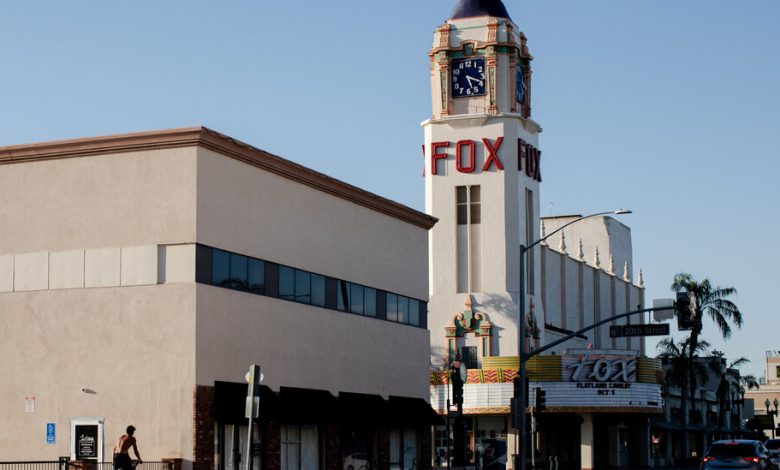In Kevin McCarthy’s Hometown, Reflections on His Sudden Fall

Outside Dagny’s Coffee Company, a downtown cafe that serves as a kind of crossroads for a broad swath of Bakersfield, Katherine Haas, 38, was trying to make sense of Kevin McCarthy’s stunning ouster as House speaker this week.
But she wasn’t viewing it through the lens of the bitter infighting of Washington. She was thinking of his representation of the increasingly diverse city of 400,000 that watched as he built a political career through the sheer force of his affability and then crashed down to Earth.
Ms. Haas, a child support specialist and political independent, said that the Bakersfield where she was raising her 13-year-old daughter was more diverse and culturally expansive than the Bakersfield she knew as a girl.
In recent years, though, she felt as though Mr. McCarthy had ignored the city’s struggles to combat homelessness and rampant substance abuse. But seeing him strike a deal to keep the government functioning, even at a personal cost, cast him in a different light.
“It’s the first time he had a backbone on doing the thing that served the best interests of our nation,” she said. “There’s been a disconnect between Kevin McCarthy and his district for a long time — he became part of that D.C. life and kind of forgot who his constituents are.”
The story of Mr. McCarthy’s relentless rise is well-known and often repeated in his hometown. He was first and foremost a nice local guy, born and raised in Bakersfield, where he also attended college. Around that time, he opened a small deli in a corner of a frozen yogurt shop owned by his aunt and uncle. (Whether this experience earned him the right to describe himself forever after as a small business entrepreneur is a matter of some discussion.)
While he was still in college, Mr. McCarthy started working for Representative Bill Thomas, an influential Republican rainmaker who took the ambitious young man under his wing. Mr. McCarthy rose through the California Legislature before being elected to Congress in 2006 as Mr. Thomas’s anointed successor. Even then, observers said it seemed clear that Mr. McCarthy was more focused on amassing political power than scoring policy wins.
Many who have watched his rise to speaker of the House say they now saw Mr. McCarthy as a kind of tragic figure — a victim not only of attacks from the extreme right or Democrats, but also of his own drive to claw his way up the political ladder.
“The problem is a little thing on your desk that says ‘speaker’ and that’s all you have,” Mr. Thomas said in an interview with a local television station after the vote to remove Mr. McCarthy from the speakership. (Mr. Thomas declined to comment on the record for this article.)
Mr. McCarthy has for years been able to rely on a strong base of support in the region’s mostly white oil and agricultural business communities. Long described as the “Texas of California,” those industries infused the culture of Kern County, the enormous expanse that includes Bakersfield. It was a hub of stripped-down country music — a place where Merle Haggard sang about being an “Okie from Muskogee.”
But Bakersfield, unlike California as a whole, has in recent years attracted new residents with relatively affordable housing in new suburban developments. And both oil and agriculture are nearing critical turning points.
“Kevin could become an anachronism in the next 10 to 12 years,” said Mark Martinez, chair of the political science department at California State University, Bakersfield. “White, conservative and out of touch with the shifting world.”
Mr. Martinez noted that Kern County’s population was almost 57 percent Latino — a population that Mr. McCarthy’s critics say he has not only ignored but also antagonized by supporting former President Donald J. Trump’s restrictive immigration policies. And Indian Americans, particularly Sikhs who have a large presence in the trucking industry, have made rapid inroads in local politics.
Of course, Mr. McCarthy, who won his most recent election by a roughly 2-to-1 margin, has plenty of supporters in a district that Mr. Martinez described as a conservative enclave tucked within an increasingly progressive region.
Holding forth at a table inside Dagny’s, Eric Warnock, 66, said Mr. McCarthy had become something of a regional hero, a local boy who made good.
Mr. Warnock, who retired from a day job and now works as a comedian, said Mr. McCarthy’s appeal to him was simple: “He’s from Bakersfield,” he said. “He’s not a lawyer.”
Later in the day, Ysidro Hernandez, 28, sat studying at Dagny’s. He said that growing up on the east side of Bakersfield, the predominantly Latino part of a racially and economically segregated city, he never saw evidence of anyone representing his family’s interests in government. (He wondered if it was by design that the part of Bakersfield where he lived appeared carved out of Mr. McCarthy’s district, almost like a thumb, to be part of a much more purple district.)
Still, the far-right has influenced conservatives across the country and Mr. McCarthy’s district is no exception.
Roger Davis, 65, a retired sheriff’s deputy, said he had voted for Mr. McCarthy because of his vows to crack down on crime, homelessness and government spending. But, he said, he feels that Mr. McCarthy, like many politicians, has failed to follow through.
So Mr. Davis said he felt a twinge of satisfaction when Mr. McCarthy was fired from his leadership job. He said he would have preferred to see the federal government grind to a halt than see his representative compromise.
“To be honest with you, if they shut down for a year, it wouldn’t change anything,” he said. “The bureaucrats run everything.”




